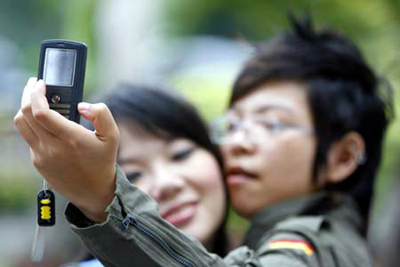
A girl shows off her iPhone. (File photo)
China is leading the global pack in modern mobile lifestyles. Young Beijing Bedouins have the cheapest, coolest and fastest cell phones and wi-fi gadgets in the world. Today's Chinese kids are super cyber-connected and savvy to the latest technology, whether it be the latest iPhone or a World of Warcraft video game.
By Valerie Sartor
China.org.cn columnist
Modern technological gadgets: young people love them and older people are trying to get used to them. For my grandmother cars represented the height in mobility; for me watching television and later riding in a Boeing 747 started me dreaming about traveling to other parts of the planet. But China's youth doesn't have to go anywhere to be deemed urban gypsies: today's technology allows them to communicate with others anywhere in the world instantly -- and it's getting better, faster and cooler as each year passes.
The American thinker Lewis Mumford started writing back in the 1950s about machines as extensions of human consciousness and the consequences of technology upon human societies. In the 1970s Marshall McLuhan, a Canadian media and communications specialist highly influenced by Mumford, wrote that the "medium is the message"-- communications technology affects the thinking process -- and ultimately the way humans organize as social units. McLuhan predicted that everyone would become a "global village citizen"when linked decisively by electronic technologies. His premise stated that technology would create a new age with one collective human identity. But McLuhan specifically stressed that we should remain aware of the media's cognitive effects because every global village has the potential, due to human frailty, to become totalitarin and full of terror.
Today's youth has grown up with technology, incorporating computers and cell phones into their ordinary lifestyle. Significantly, in Beijing almost every young person I know owns a laptop and a fancy cellphone -- these kids are part of the generation I term contemporary nomads because they have the capacity to travel through cyber space and communicate with other people living around the globe. Only limited by their gear and their gadgets, these Beijing Bedouins travel light: the city is full of cyber-oases and cell towers that cater to their crowd. As modern migrants they seem more interested in cyber-connectivity than in travelling across geographical spaces, although many of the curious and able do cross national boundaries to explore other regions of the globe.

Two young lovers take pictures by using cell phone camera. (File photo)
Chinese young people rejoice that wireless data connections seem to be getting better all the time. Cellular networks are faster and more reliable. Short-range Wi-Fi hotspots are popping up in ever more places. And a new generation of wireless technologies is already poised to take over, creating wild concepts such as "ultra-reality" that confuses old folks like me but delights the Beijing Bedouins. Yet I like cell phones. When I was younger mobile phones were already widespread, but found mostly in cars because they were so large and clunky; they were used almost exclusively for voice calls. Connecting them to the Internet and even to computers was still unknown when I was thirty.